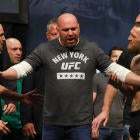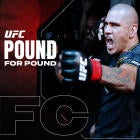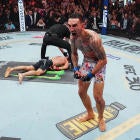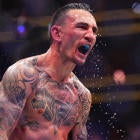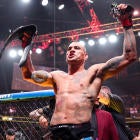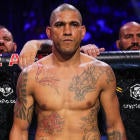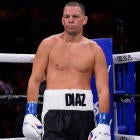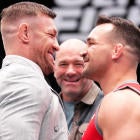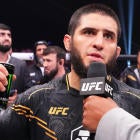NEW YORK -- On Thursday, at a press conference crafted to celebrate one of the UFC's most important moments, Dana White found himself in the rare position of having to wait on someone else.
His most important star -- check that, the star, a man neither controlled nor possessed by anyone, White included -- was an intentional no-show. Conor McGregor would arrive later, but for the moment, White's triumphant victory of bringing mixed martial arts and UFC 205 to New York was overshadowed.
"Finally," White said, missing the irony, "we're here!"
McGregor, having held the press conference hostage long enough, arrived and stole the show. As much as it was McGregor's world, and as surely as White faded into the background of an event that should have been his own personal spotlight, the moment also served as a strangely quiet but wholly deserved triumph for the UFC president.
As White crafted the sport and the UFC into a cultural force and money-making engine, the last bastion against full respectability and acceptance refused to fall: New York, the most important place on Earth, particularly if you hope to succeed on the American sports, cultural and media landscapes.
UFC has drawn crowds and spread its fervor across the country, the continent and the world. But Saturday will be the first time New York has given its powerful and unique energy and endorsement to the octagon.
"This is not like any other night. This is a massive, enormous show," White said. "[Saturday] night's going to be a special moment when they walk out into Madison Square Garden."
Three title fights, McGregor's enormous relevance, and the buzz around UFC in NYC is absolutely a big, cool, great moment for mixed martial arts. But it's also a crowning achievement for White himself, the final jewel on a crown that he's been trying to fashion for a long time.
It was only 15 years ago when White convinced his friends, the Fertitta brother, to buy UFC for $2 million and put him in charge of whatever future he could shape for it. At UFC 33, only the third fight under the new ownership group, the pay-per-view buys were just 75,000.
By the time UFC 202 arrived, after years of White's iron fist and brilliant -- if domineering -- vision, the sport had grown to the point that it pulled in 1.65 million buys. He'd also molded the company into a force that commanded a purchase price of $4 billion -- a deal that both paid White handsomely and kept him invested in and running the empire he's built. His net worth is estimated at $500 million.
All of that makes the man a roaring success, of course, and the sport ascendant, valuable and lucrative. But even billion-dollar sports enterprises must fight to evolve and survive and remain relevant. Ask the NFL right now. Ask the NBA after Michael Jordan retired. Ask Major League Baseball after the strike, or NASCAR, or golf as Tiger Woods' greatness fades to a smudged memory.
For UFC, then, the fight continues. And this is America. It's not just true about New York that, if you can make it here, you can make it anywhere. It's also true, at least for a franchise like UFC that requires media attention and buzz and legitimacy, that if you cannot make it here you'll always be in danger of losing your ability to make it everywhere else.
There were legal obstacles, obstinacies and the powerful machine of New York state, which once opposed UFC and set its sights on the failure of MMA. Dana White and the company he crafted beat back all of that.
When UFC 205 gets underway Sunday under the bright lights of the greatest venue on Earth -- and the energy around midtown Manhattan blends wholly with the energy inside The Garden as an incredible card plays out -- it won't just be great theater, a touchstone for UFC and the perfect background noise to McGregor's place as a true superstar.
It will be one of the crowning achievements of Dana White, the man without whom this would have been utterly impossible.












